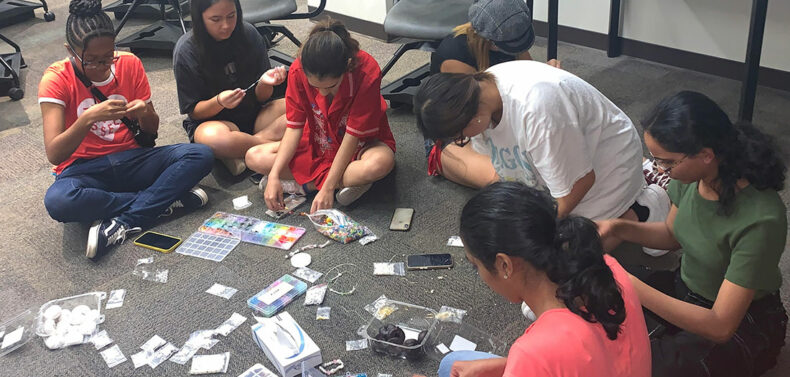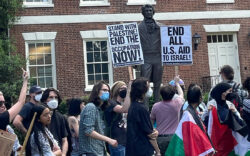Third-year UGA students Rana Ahmed and Sarah Hashami have started a new fundraising organization devoted to international crisis relief and cultural appreciation. Their strategy—arts and crafts.
Students for International Causes (SIC) is a global affairs and cultural collective committed to igniting change where it is needed most. Its primary fundraising method relies on the artistic expression of its members. The organization plans on hosting informative and interactive meetings where members can create art together for specified, rotating causes. From canvas paintings to fashion jewelry, all proceeds from art sales will be donated toward credible humanitarian agencies or used for club management. These sales are scheduled to occur on campus and online, via the club’s Instagram. Members can also donate their personal artworks.
The first portion of the semester, members decided at the recent meeting, will be dedicated to the oppression and ongoing human rights violations in Afghanistan. Amnesty International says that “restrictions on women’s rights, freedom of the media and freedom of expression [have] increased exponentially” in the past year under the Taliban’s reign. As an Afghan woman herself, Hashami understands the severity of the situation. She said her nieces in Afghanistan are banned from attending secondary school, and that the only hope for them is immigration. This story resonated with the group members, and they began crafting.
“When you do [activities] with a group of people that you enjoy being around and you’re doing things that you love to do, then it becomes less work and more of a positive experience, like an artistic collaboration that results in something good,” Hashami said.
In addition to funding for global issues, SIC is also arranging opportunities for local volunteer work. One of the organization’s main priorities is refugee assistance. This year, the focus is on the Hispanic community, which makes up over 36% of all immigrants in Georgia. SIC believes that offering support at the individual level is key to sustainable development, and distribution of daily supplies, legal guidance and language education are essential for all immigrants. While it’s still under discussion, SIC plans to partner with organizations like U-Lead Athens for future service projects and volunteer allocation.
SIC strives to transform fundraising into long term solutions. According to Ahmed, many instances of digital activism—for example, through trending hashtags and reposting of infographics—lose their appeal after an initial period of virality. Engagement with such posts are largely performative, or done to increase an individual’s social capital. For this reason, the organization is devoted to educating the student body through hands-on work. Ahmed explained that simply being aware of crises as they occur might evoke a temporary sense of sympathy, but that isn’t enough. In showing solidarity, purpose-driven initiatives are crucial.
“We all know, there’s so many fundraisers on Instagram, and people just talking generally about, you know, crises like Palestine. But the problem with that is so many people will just make it go viral for a week, and then forget about it,” Ahmed said. “We understand how beautiful these cultures are. And we know for people to continue caring about them, you have to really get them enamored with the culture and see that this is a really beautiful thing, worthy of preservation.”
Since SIC has only been an official club since August, guidance from established organizations will prove beneficial. Ahmed and Hashami are currently in contact with multiple groups both within and outside of UGA. One of them is Students for Hope at Harvard University, a subset of the Together for Hope coalition focused on combating rural poverty across the country. Another includes the Students for Justice for Palestine at UGA, which is at risk of losing its club status this year, due to a lack of leadership. If SIC can recruit other advocacy groups with an international scope, or even merge with existing chapters, it would likely see a boost in both engagement and outreach results.
To further understand the causes being addressed, SIC will be offering educational workshops for the public. By providing a platform for refugees, immigrants and other affected individuals to share their stories, the organization hopes to combat any misinformation surrounding them. Wrapping up the year, SIC will host its own gala, complete with cuisine, live music and traditional choreography, to celebrate the beauty of the spotlight cultures.
Like what you just read? Support Flagpole by making a donation today. Every dollar you give helps fund our ongoing mission to provide Athens with quality, independent journalism.










